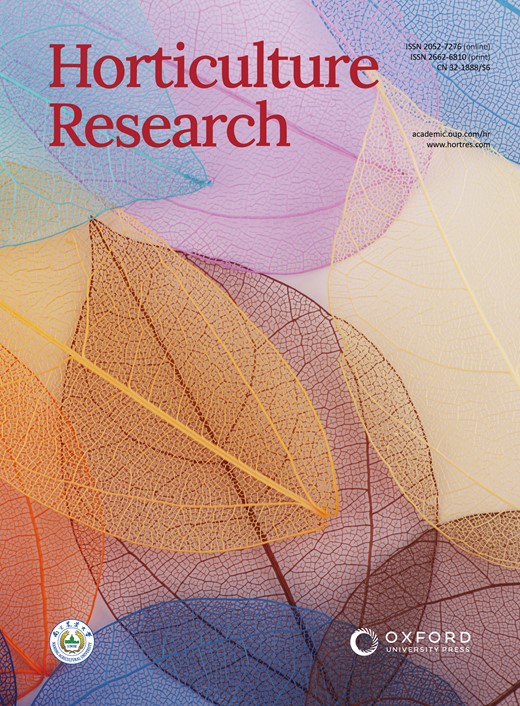褪黑素通过抑制苹果果实成熟过程中转录因子MdREM10抑制乙烯生物合成
IF 8.7
1区 农林科学
Q1 Agricultural and Biological Sciences
引用次数: 0
摘要
乙烯,一种植物激素,是苹果成熟所必需的。褪黑素(MT)影响苹果果实成熟过程中乙烯生物合成的确切分子机制尚不清楚。本研究发现,外源MT处理抑制了乙烯的产生,延缓了苹果果实的成熟。苹果果实内源MT含量与果实成熟过程中乙烯产量呈负相关,表明MT在苹果果实中具有成熟抑制作用。MT处理抑制了苹果果实成熟过程中关键乙烯合成基因MdACS1和MdACO1的表达。MT处理降低了转录因子MdREM10和MdZF32的表达水平。MdREM10结合MdERF3启动子,增强其表达,随后促进MdACS1转录。此外,MdREM10直接结合MdZF32启动子,促进其转录。MdZF32直接结合MdACO1启动子,诱导其表达。研究结果表明,MT通过抑制MdREM10抑制乙烯生物合成和果实成熟,通过MdERF3上调间接促进MdACS1转录,通过MdZF32上调间接促进MdACO1转录。本文章由计算机程序翻译,如有差异,请以英文原文为准。
Melatonin suppresses ethylene biosynthesis by inhibiting transcription factor MdREM10 during apple fruit ripening
Ethylene, a plant hormone, is essential for apple (Malus domestica) ripening. The precise molecular mechanism by which melatonin (MT) influences ethylene biosynthesis during apple fruit ripening remains unclear. This study found that exogenous MT treatment inhibited ethylene production and postponed apple fruit ripening. The endogenous MT content of apple fruits exhibited an inverse correlation with ethylene production during fruit ripening, suggesting that MT functions as a ripening suppressor in apple fruits. MT treatment suppressed the expression of key ethylene biosynthesis genes, MdACS1 and MdACO1, during apple fruit ripening. MT treatment decreased the expression levels of transcription factors MdREM10 and MdZF32. MdREM10 binds to the MdERF3 promoter, enhancing its expression and subsequently promoting MdACS1 transcription. Furthermore, MdREM10 directly bound to the MdZF32 promoter, promoting its transcription. MdZF32 directly bound to the MdACO1 promoter, inducing its expression. The findings suggested that MT suppresses ethylene biosynthesis and fruit ripening by inhibiting MdREM10, which indirectly promotes MdACS1 transcription via MdERF3 upregulation, and MdACO1 transcription via MdZF32 upregulation.
求助全文
通过发布文献求助,成功后即可免费获取论文全文。
去求助
来源期刊

Horticulture Research
Biochemistry, Genetics and Molecular Biology-Biochemistry
CiteScore
11.20
自引率
6.90%
发文量
367
审稿时长
20 weeks
期刊介绍:
Horticulture Research, an open access journal affiliated with Nanjing Agricultural University, has achieved the prestigious ranking of number one in the Horticulture category of the Journal Citation Reports ™ from Clarivate, 2022. As a leading publication in the field, the journal is dedicated to disseminating original research articles, comprehensive reviews, insightful perspectives, thought-provoking comments, and valuable correspondence articles and letters to the editor. Its scope encompasses all vital aspects of horticultural plants and disciplines, such as biotechnology, breeding, cellular and molecular biology, evolution, genetics, inter-species interactions, physiology, and the origination and domestication of crops.
 求助内容:
求助内容: 应助结果提醒方式:
应助结果提醒方式:


